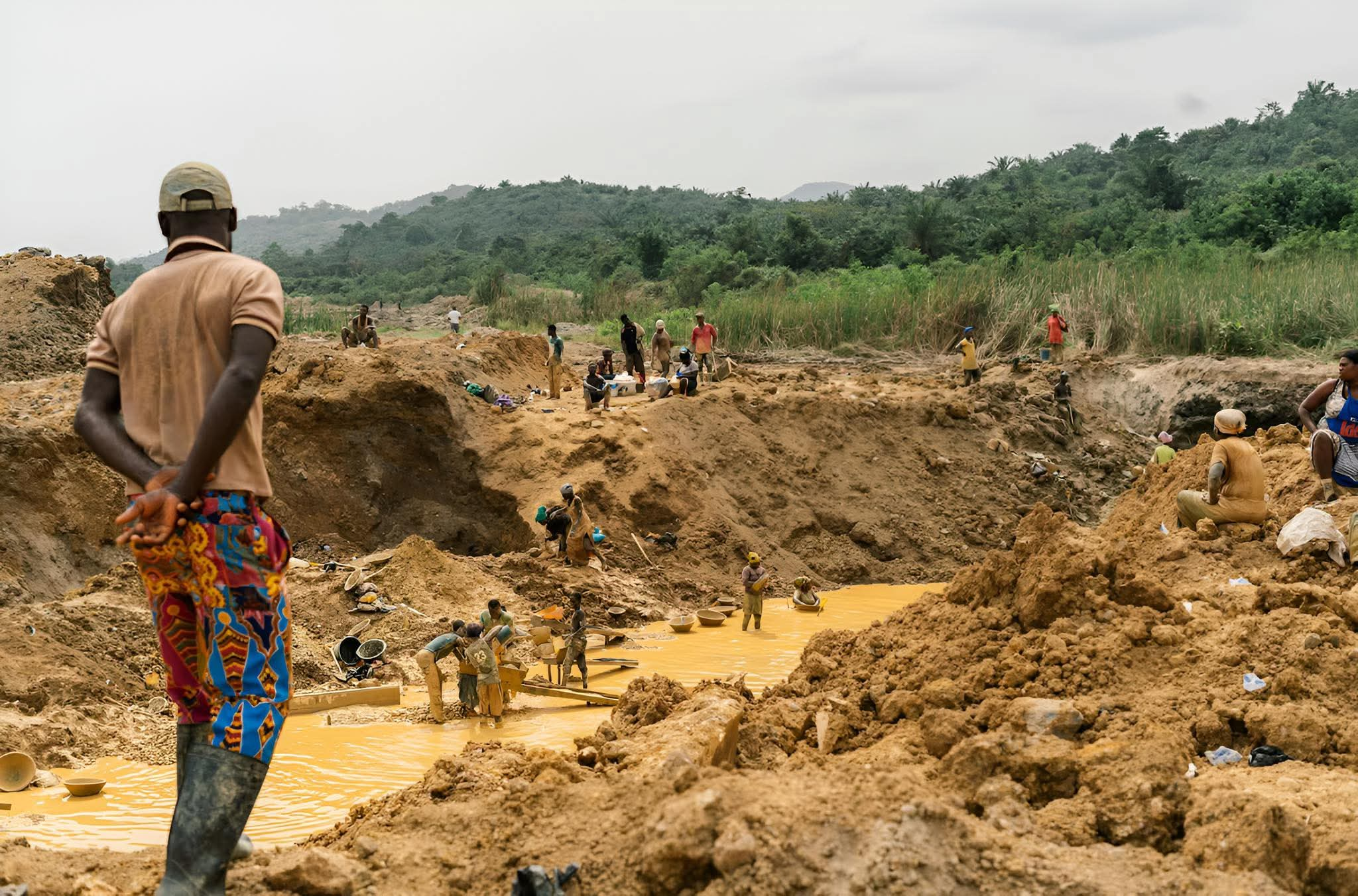The Ghana Voice,
Accra, Ghana

Ayensu River Murdered:Kay Codjoe Writes on Galamsey Menace.
The Ghana Voice 23-09-2025The River Ayensu is not just polluted; it has been murdered. And the chief suspects are walking around with microphones. When President Akufo-Addo, in 2017, declared, “I put my presidency on the line to fight galamsey,” many of us thought the fight had truly begun. Eight years later, what do we have? Dead rivers. Poisoned waterworks. And NPP politicians now pretending to be environmental saints.
Today, that betrayal is no longer theory, it is reality. The Kwanyako Headworks, which once supplied over 25,000 cubic metres of clean water daily, has been shut down for weeks because the Ayensu is so choked with silt and chemicals that the pumps have collapsed. This single failure has left entire communities across the Central Region gasping. From Agona Kwanyako, the epicenter, to Agona Swedru, Agona Asafo, Mensakwaa, Osebo Nkwanta, Kokoodo, Ayensuano, Mankrong, and stretching through Agona East, Agona West, Gomoa East, Gomoa Central, Awutu Senya, Ajumako Enyan Essiam, Ekumfi, Asikuma Odoben Brakwa, taps have run dry. Families trek miles for unsafe streams. Mothers boil brown water and pray their children won’t fall sick. This is the human cost of political deception.
And yet, look who is loudest now. Dennis “Miracle” Aboagye arrives with cameras rolling, blaming Mahama. Paul Yandoh kneels in public, begging for a state of emergency. But where were these men when their government passed LI 2462 in 2022, legalizing mining in forest reserves and opening the floodgates of destruction? Where were they when Operation Vanguard and Operation Halt turned into daytime drama, soldiers chasing miners under the sun while the same pits glowed with mercury under the moon? Where were they when chiefs and engineers warned that Kwanyako’s pumps would one day choke to death?
Now they are loud, but it is the empty noise of a market quarrel, not the sober truth of a people in pain.
The facts, stubborn as they are, remain. In 2017, Akufo-Addo swore his presidency on stopping galamsey. The rivers believed him, the people believed him. Between 2018 and 2020, task forces were deployed, but galamsey thrived under political patronage. In 2022, the NPP passed LI 2462, opening forest reserves to mining, the final insult. By the time Mahama returned to power in 2025, the Ayensu was already a corpse.
And along the way, the scandals piled high. The Frimpong-Boateng report exposed how party apparatchiks and government insiders sabotaged enforcement while profiting from illegal mining. Seized excavators mysteriously vanished, some protected by the very task forces deployed to destroy them. The NPP’s Ashanti Regional Chairman, Bernard Antwi-Boasiako, known as Wontumi, was repeatedly fingered as a political baron of galamsey. Operation Vanguard, launched with fanfare, degenerated into extortion and selective justice. Billions of cedis in revenue were lost to smuggling and under-declared gold exports, while polluted rivers left towns like Kwanyako drinking mud. These are not allegations plucked from the air; they are documented failures that define the NPP’s galamsey years. The NPP’s era of politically protected galamsey amounted to state-sponsored eco-terrorism.
But Mahama’s NDC cannot simply manage this crisis; they must be BOLD enough to finish what they have started. To their credit, the new government has already begun rolling back the worst of the NPP’s excesses. Moves have been made to revoke L.I. 2462 and its amendment, L.I. 2501, to publish concession data, and to restore affected waterworks like Kwanyako. Community-led protection initiatives are being piloted, and there is talk of prosecuting those who turned state power into a shield for galamsey. These are commendable beginnings.
Yet beginnings are not enough. The people of Kwanyako and beyond need assurance that these reforms will not stall under pressure. They need guarantees that the list of concessions will not gather dust in drawers, that prosecutions will reach the politically powerful and not just the powerless, and that restoration will be sustained rather than symbolic. Only then will this government prove it is not inheriting hypocrisy but rewriting the story with clean water and renewed land.
The NPP has already written its legacy in silt and sludge. The NDC has a chance to write theirs in clean water and restored land. The question is whether they will sustain it, or whether future generations will remember both parties as undertakers of our rivers.
Kay Codjoe
